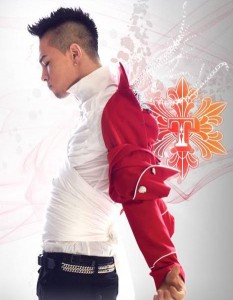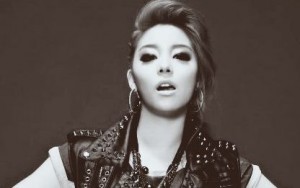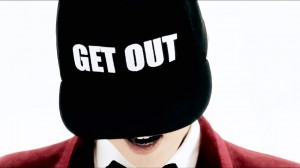 Almost all idols today seem to have a list of musical inspirations that more often than not contains a roster of American artists. We know that Hoya looks up to Chris Brown and we know about BoA‘s love for Janet Jackson and Britney Spears. Some even have met their inspirations despite the divide of international waters like IU and Corinne Bailey Rae. And I don’t think I can name all the people who have listed Michael Jackson or Omarion on these lists.
Almost all idols today seem to have a list of musical inspirations that more often than not contains a roster of American artists. We know that Hoya looks up to Chris Brown and we know about BoA‘s love for Janet Jackson and Britney Spears. Some even have met their inspirations despite the divide of international waters like IU and Corinne Bailey Rae. And I don’t think I can name all the people who have listed Michael Jackson or Omarion on these lists.
Generally it’s easy to understand why these lists are the way that they are. Besides the fact that most of these artists have achieved recognizable global fame, K-pop as it is today has not been around for that long. With it only having really kicked off in the 90’s with Seo Taeji & The Boys, a little outside direction isn’t necessarily a bad thing. And K-pop has definitely slowly grown since then, albeit slowly at times. Quite a few groups that by now have found their niche in the K-pop world, that will affirm that their image doesn’t fade away too quickly. With that being said though, what do solo artists have that make them different from each other?
Finding your own definite slot in K-pop as a soloist can in some ways be a lot harder than in a group. When it comes to one performer on stage, it’s all about filling the area with your one presence. This can obviously be done with a powerful ballad or an energetic dance track, but it’s still the main criteria for most solo artists. So what do you do when you want to distinguish yourself from the pack? You become the Korean version of… whoever.
You should have heard some of the titles given but if you haven’t, here’s a few. We have Ailee as the Korean version of Beyoncé who is constantly fighting Sistar‘s Hyorin for that label. We also have Lee Hi who’s been crowned the Korean Adele by the Wall Street Journal. Even for the guys, we have Rain as Korea’s Usher and Se7en is their very own Justin Timberlake.
 When I first heard of these comparisons, I didn’t think too much about them. That was until the realization one day that I had started judging these idols on them literally being the Korean versions of these artists. In my mind, I had critiqued Ailee’s performances based on my knowledge of the performance ability of Beyoncé. Ailee officially debuted last year, while Beyoncé has had over ten years experience in the music industry being out of her group. Connecting the two was not only not fair based on that alone, it also denied Ailee, and any other idols compared, their own musical identity: something which is much less of a problem when you’re not on your own.
When I first heard of these comparisons, I didn’t think too much about them. That was until the realization one day that I had started judging these idols on them literally being the Korean versions of these artists. In my mind, I had critiqued Ailee’s performances based on my knowledge of the performance ability of Beyoncé. Ailee officially debuted last year, while Beyoncé has had over ten years experience in the music industry being out of her group. Connecting the two was not only not fair based on that alone, it also denied Ailee, and any other idols compared, their own musical identity: something which is much less of a problem when you’re not on your own.
Being in a group can be a good and bad thing. Groups oftentimes have it easier when they want to change concepts or styling. There could be more vocals to work with, helpful in making great harmonies on stage, better energy when dancing as a unit, and there is also the simple fact that you have someone next to you, willingly to work just as hard as you to get to the same level. It relieves some pressure. But then you have things like less camera time (especially if you’re not the most popular member), criticism on everyone when one of you makes a mistake and of course, the real pain, having to split that paycheck.
Being solo obviously doesn’t allow you to have the same problems a group does, but people don’t think that often about what else it takes to be on a stage by yourself. So when some artists excel on stage we may think to applaud them highly for their efforts. But using comparisons to some American artists shouldn’t be the determining factor, even if they are just as good.
 Gaining a definite musical identity and making it your own is crucial for longevity. Hearing “You sound like…” or “You remind me of…” for most of a career doesn’t speak much for anyone trying to establish themselves. What may start out as a compliment could quickly turn into something restricting, and some idols have noticed this. Though Rain could qualify as a legend in his own right, he has made it clear that he wants to known as Rain and not a version of someone else. And though many may see G-Dragon as a Korean Kanye West, we know he’s not one to be confined by labels as he pointed out in his XXL interview a few months back.
Gaining a definite musical identity and making it your own is crucial for longevity. Hearing “You sound like…” or “You remind me of…” for most of a career doesn’t speak much for anyone trying to establish themselves. What may start out as a compliment could quickly turn into something restricting, and some idols have noticed this. Though Rain could qualify as a legend in his own right, he has made it clear that he wants to known as Rain and not a version of someone else. And though many may see G-Dragon as a Korean Kanye West, we know he’s not one to be confined by labels as he pointed out in his XXL interview a few months back.
This K-pop title might be good for now, but looking ahead it could hold me back, like a prison of sort.
Having a similarity is one thing. But not being able to separate yourself from it a bit, is another. I’d say it’s about time to just let these artists be themselves without the comparisons and sway my feelings for them all on their own merit. What do some of you readers think? Do you think the comparisons push some idols out to the forefront or do they hold them back?

